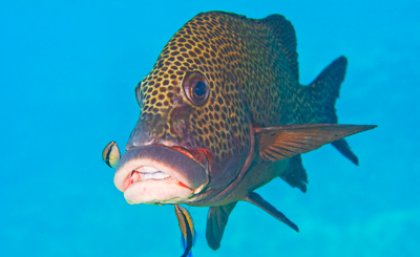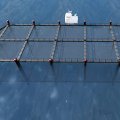
Telling your partner to watch her weight is not recommended-unless you’re a male cleaner fish, reports a new study in Proceedings of the Royal Society B.
Scientists from the University of Queensland, the Zoological Society of London (ZSL) and the University of Neuchatel have now shown that male fish lose more than just a meal from their partner’s big appetite – they also risk the female becoming so large that she will turn into a rival male.
Dr Lexa Grutter, co-author from The University of Queensland, says the groups’ research shows that male cleaner fish are aware of their female partner's size.
“One reason males punish cheating females may be to stop her from eating too much and then challenging his position as the dominant male on the reef,” Dr Lexa Grutter said.
Cleaner fish feed in male-female pairs by removing parasites from larger ‘client’ fish. While providing this cleaning service, cleaners may get greedy and bite clients rather than sticking to parasites. This cheating by cleaners causes mealtimes to come to an abrupt end as the disgruntled client fish swims off. Females that bite clients receive aggressive punishment from their male partners for such greedy behaviour.
Cleaner fish live in groups led by one dominant male with a harem of up to 16 females. All cleaner fish are born female and turn into males when they become the biggest fish in their group. A male cleaner fish usually partners with the biggest female fish in the harem for cleaning duties.
The research also shows that the male cleaner fish can distinguish between high and low value meals and will punish the female more severely if she drives off a high-value client.
Dr Lexa Grutter said that the female fish will respond to this punishment by providing better service to high value clients in the future.
“This is the first non-human example of where punishment fits the crime and results in the offender adjusting their behaviour according to the potential penalties,” Dr Grutter said.
Cleaner fish and humans may not share many physical traits, but cleaner fish punish cheating individuals, just as we punish people who step outside of the law. In both situations, harsher punishment may serve as a stronger deterrent against future crimes.
Future research will address how cleaner fish assess how market forces affect the service quality that cleaner fish provide to client species.
• The paper ‘Male cleaner wrasses adjust punishment of female partners according to the stakes’ (DOI:10.1098/rspb.2011.0690) will be published online in Proceedings of the Royal Society B on Wednesday 15 November. Advance copies of the paper are available from Daisy Barton at the Royal Society Press Office: 020 7451 2510 or daisy.barton@royalsociety.org
• The bluestreak cleaner wrasse (Labroides dimidiatus) is one of several species of cleaner wrasse found on coral reefs in the Indian Ocean and much of the Pacific Ocean, as well as many seas, including the Red Sea and those around Southeast Asia. Like other cleaner wrasses, it eats parasites and dead tissue off larger fishes' skin in a mutualistic relationship that provides food and protection for the wrasse, and considerable health benefits for the other fish
Images: High-resolution images are available on request from Tracey Franchi
Media: Dr Lexa Grutter, The University of Queensland, email: a.grutter@uq.edu.au; or Tracey Franchi, School of Biological Sciences Communications Manager, telephone: +61 7 3365 4831, email: t.franchi@uq.edu.au








